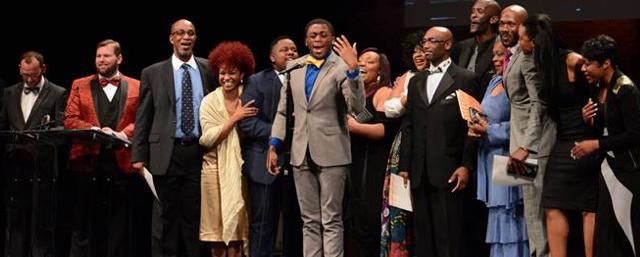Helen Hayes: Double the Awards, Double the Fun
By • April 23, 2015 0 575

At the Helen Hayes Awards held at the venerable, history-drenched Lincoln Theatre on U Street April 7 with a party at the relatively nearby Howard Theater afterward, it was still the same old story, in the sense that the awards, named after the legendary stage actress, were meant to honor the outstanding achievements in the entire Washington theater community.
This process was always a little unwieldy and often, but not always, rewarded the more established members of the theater community. This year, the folks in charge decided to level the playing field and broaden the reward field a little and a lot by coming up with two sets of awards—the Helens and the Hayes—with the Hayes awards designated for shows in which half of the performers and artists are members of the union Actor’s Equity, and the Helen awards going to shows which are not.
The result was a total of 47 categories to be decided in one evening, and at least five times that number of individuals nominated. The Helen Hayes Awards, no matter where they were held, or who was nominated, always tended to be rich but lengthy evenings, what with special awards, musical numbers and sometimes longish speech. The thought of the number of categories as doubled no doubt sent shivers through the spines of both the audience members, writers, nominees and other sundry folks, fantasizing an event that might run into midnight.
Surprise! Folks needn’t have worried. The show itself probably set a record for brevity, finishing around a quarter past nine at a clip that left everybody breathless and the bartenders out in the lobby busy. Organizers enforced a strict 30-second time limit for acceptance speeches, which left us all with an often amusing spectacle of winners racing to the stage, women dropping or leaving high heels in the aisles or in the seats. That left no time to thank everybody, or thoughtful if lengthy reflections on journeys from here to there and this moment, but left room for heart-felt emotions, many occasions of inventiveness, and no blame for leaving out thank yous.
If the idea was to be more inclusive in spreading the wealth and joy, it worked—Theater Alliance, a small, but sterling, group working out of the Anacostia Playhouse, wound up with the most awards—seven—as a member of the Helen faction, for its wonderful revival of “Black Nativity,” which won outstanding musical (Helen) and the lesser known “The Wonderful World of Dissocia” which took best play (Helen).
The confusion and profusion of categories rarely abated—it was just too damn difficult to keep track of things—and that included the unlucky presenters who misplaced data every now and then.
Certain things were still decipherable—every year, it seems a theater has its moment of breakthrough—not just Alliance in the Helens but also Olney Theater, which burst through in the Hayes group with four awards for the highly original , edgy and one-of-a-kind straight play “Colossal,” which got playwright Andrew Hinderaker the Charles MacArthur Award for outstanding original play. “Colossal,” which was about football but also movement and dance, was a critical smash and garnered three other awards.
Other more or less “big” winners were Signature’s “Sunday in the Park with George,” which shared best musical (Hayes) honors with the Kennedy Center’s “Side Show,” which also won outstanding ensemble in a musical (Hayes). “George” got a best direction award for Jon Kalbfleisch, cementing his reputation as a major director via Signature.
Speaking of big wins and rising stars—Erin Weaver took two best supporting actress awards and was a part of the team that took the outstanding play or musical adaptation for “The Gift of Nothing” at the Kennedy Center. She and her husband Aaron Posner wrote the adaptation.
The consistently original and gifted actress Kimberly Gilbert received the just rewards her character did not when she beat out Kathleen Turner (“Mother Courage” at Arena) for best actress in a play (Hayes) for her truly star turn as “Marie Antoinette” at Woolly Mammoth.
“Little Dancer,” the ground-up and much praised Kennedy Center musical, had only one nomination but won it—a get for choreographer Susan Strohman.
And, as is sometimes the case with these awards, Studio Theatre, with no wins for the evening won the last award—best play (Hayes) for “Cock.” Artistic director David Muse accepted the award with a funny, but perhaps predictable, observation.
So, what was different? Well, change comes to everything as it must: no musical numbers, no long speeches, more and more rising artists, which is a good thing, loudly vocal and whistling and cheering and having a ball through the proceedings as more and more of their number ran up to the podium. “Wow,” a Washington Post rep said, “I didn’t know actors were in such good shape.”
But it was also a sign that the theater community as a whole—divided into Helens and Hayes or not—was in good shape, in terms of diversity, in terms of interests, talent, and new works. The volume of noise and energy at the awards spoke, well, volumes to the health of the organizers, theatreWashington, of theater in Washington and of the Helen Hayes (or should we say, Helen-Hayes) Awards.
For any and all details, winners, nominees and other information, visit the Theatre Washington website.

